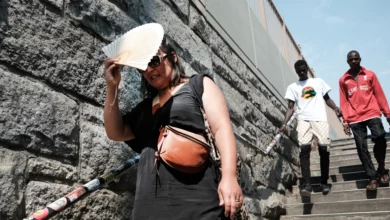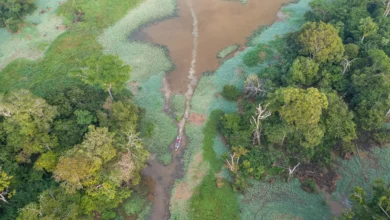A fertilizer production factory in Talkha, Daqahliya continues to face growing public anger due to the environmental costs associated with it.
“The factory has been around for 35 years," says Mohamed el-Shennawy, who spearheads a collaborative campaign aimed at combating environmental violations in Daqahliya. "Its expiration date is long past.”
The factory, part of El Delta Company for Fertilizers and Chemical Industries, is housed on rich agricultural soil only meters away from the homes of residents of the adjacent village of Meet Anatar. The factory has come under fire recently by local residents following rumors of a planned expansion.
Rallies were held late last December calling for a halt to the alleged expansion plans, with many residents demanding that the plant in its entirety relocate away from residential areas.
“Almost every home around this factory has an instance of serious kidney, liver or lung problems, while cancer rates are off the charts,” says el-Shennawy. He believes that the looming factory expansion will only serve to heighten the negative impact on public health in the area and increase overall pollution levels.
The factory has suffered from two instances of ammonia leaks within the past week alone, with a large explosion in the plant’s compound shattering several windows in neighboring buildings.
Atef el-Diasty, head of the company’s commercial sector, denies that the factory has any plans to expand. He claims that the factory is simply replacing an old ammonia storage unit with a newer one. “The new unit will be cleaner and more environmentally-friendly,” el-Diasty says.
But according to el-Shennawy, the old storage unit–which had held only 200 tons of ammonia–stopped working in late 2008. “The replacement will hold 1200 tons,” he says, “allowing the entire factory to increase its production levels and thereby increase its pollution emissions.”
Even without the new storage unit, the company managed to earn a reported LE700 million in revenue last year. “And yet they still complain about the costs of relocating,” says el-Shennawy.
The campaign against the factory was bolstered by the company’s failure to make its Environmental Impact Assessment (EIA) available to the public, or to garner the approval of local civil society groups. “These two conditions are part of Egypt’s environment law, and neither has been met,” says Mahmoud el-Kady, head of legal affairs at the Cairo-based Habi Center for Environmental Rights.
“Moreover,” el-Kady goes on, “there is a third condition: the company must hold a public hearing to explain to the local community exactly what is going to take place and how it will affect them.” Both el-Kady and el-Shennawy described an earlier public hearing held to this effect as "a farce."
“The venue for the hearing wasn’t even publicized until the last minute,” says el-Kady. “And then it was abruptly changed.”
Those who did manage to attend the hearing, says el-Shennawy, were not given access to the 204-page EIA, “which is supposed to be made available to people in summarized form so as to be understandable to them.”
The Habi center wrote a letter to Environment Minister Maged George in which they requested a second public hearing, but were told simply that a hearing had already been held. Attempts by Al-Masry Al-Youm to reach ministry officials or the Environmental Affairs Agency for comment met with failure.
Given the growing tide of public anger, one of the campaign’s chief priorities is to prevent the local community from taking matters into their own hands. “People have had enough,” says el-Shenawy. “If it weren’t for those running this campaign, angry residents would have burnt the factory down by now.”
Yet campaign leaders remain optimistic despite the circumstances. A trial is currently set for 2 March, in which George, Prime Minister Ahmed Nazif and Daqahliya Governor Samir Salam are expected to be summoned. The hearing will take place at the State Council Administrative Court in Cairo.
“And if all else fails,” says el-Shennawy, “we’ll leave the people of Meet Antar to handle things their way.”




